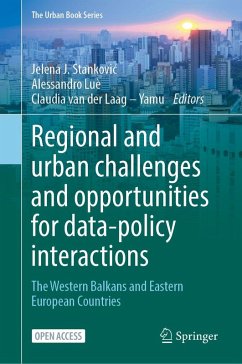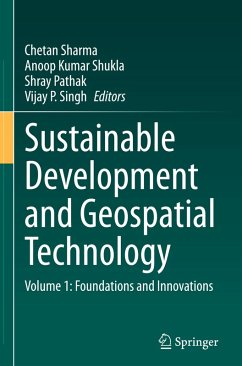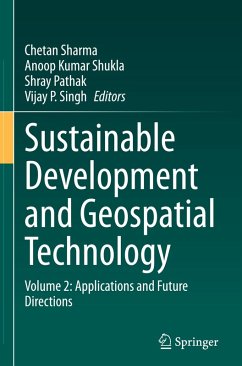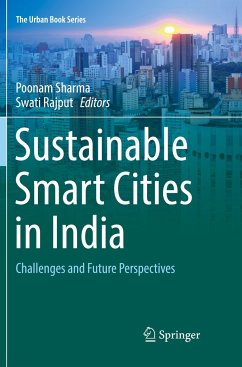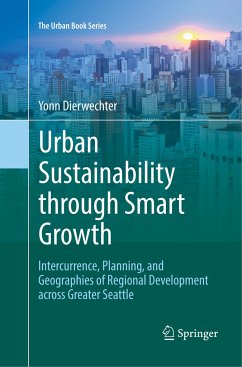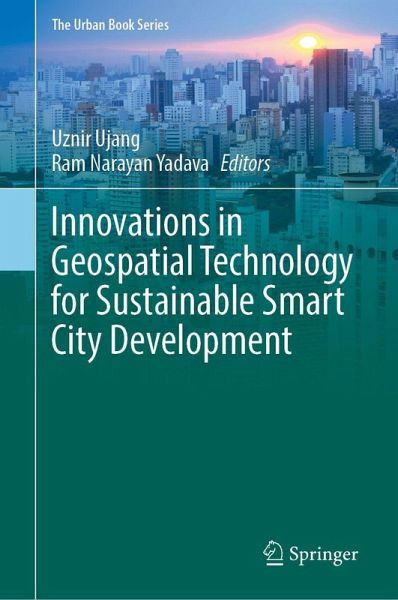
Innovations in Geospatial Technology for Sustainable Smart City Development
Versandkostenfrei!
Versandfertig in 6-10 Tagen
121,99 €
inkl. MwSt.

PAYBACK Punkte
61 °P sammeln!
As urban populations continue to grow, so too does the demand for efficient, sustainable, smart urban solutions. This book offers new approaches to challenges associated with urbanization by focusing on practical applications of geospatial technologies.This book addresses the paradigm shift toward smart cities, advancements in geospatial data utilization, and the integration of graph databases and GIS for infrastructure management. It examines the key features of urban mobility, the enhancement of smart city infrastructure with GNSS-based cadastral reference marks, and the utilization of high-...
As urban populations continue to grow, so too does the demand for efficient, sustainable, smart urban solutions. This book offers new approaches to challenges associated with urbanization by focusing on practical applications of geospatial technologies.
This book addresses the paradigm shift toward smart cities, advancements in geospatial data utilization, and the integration of graph databases and GIS for infrastructure management. It examines the key features of urban mobility, the enhancement of smart city infrastructure with GNSS-based cadastral reference marks, and the utilization of high-definition surveying and oblique photogrammetry for 3D acquisition. Additionally, it addresses coastal erosion assessment, spatial intelligence for high-rise building maintenance, and empirical comparisons of managing spatiotemporal data in existing graph data structures. It also highlights the importance of urban planning and geospatial integration for sustainable urban cemeteries management, the harnessing of topology for smart urban development, and the enhancement of building material classification through neural network technology. It discusses the role of geospatial data in managing water-related disasters, optimizing urban planning for climate and environmental sustainability, and revolutionizing infectious disease epidemiology through Geo-AI modeling.
Innovations in Geospatial Technology for Sustainable Smart City Development offers innovative solutions and insights into the use of spatial data for urban planning and sustainability, with lessons for those committed to advancing smart city technologies and sustainable urban development.
This book addresses the paradigm shift toward smart cities, advancements in geospatial data utilization, and the integration of graph databases and GIS for infrastructure management. It examines the key features of urban mobility, the enhancement of smart city infrastructure with GNSS-based cadastral reference marks, and the utilization of high-definition surveying and oblique photogrammetry for 3D acquisition. Additionally, it addresses coastal erosion assessment, spatial intelligence for high-rise building maintenance, and empirical comparisons of managing spatiotemporal data in existing graph data structures. It also highlights the importance of urban planning and geospatial integration for sustainable urban cemeteries management, the harnessing of topology for smart urban development, and the enhancement of building material classification through neural network technology. It discusses the role of geospatial data in managing water-related disasters, optimizing urban planning for climate and environmental sustainability, and revolutionizing infectious disease epidemiology through Geo-AI modeling.
Innovations in Geospatial Technology for Sustainable Smart City Development offers innovative solutions and insights into the use of spatial data for urban planning and sustainability, with lessons for those committed to advancing smart city technologies and sustainable urban development.





